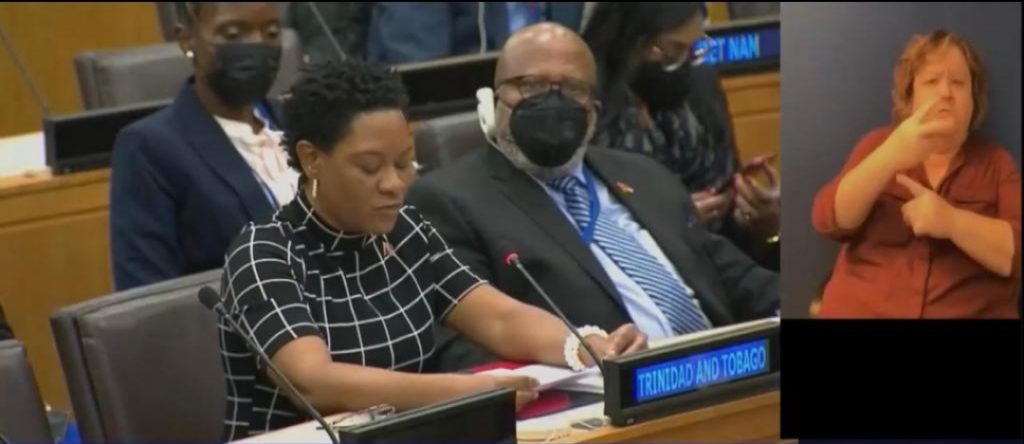NATIONAL STATEMENT OF
THE REPUBLIC OF TRINIDAD AND TOBAGO
DELIVERED BY
THE HONOURABLE AYANNA WEBSTER-ROY
MINISTER OF STATE IN THE OFFICE OF THE PRIME MINISTER
REPUBLIC OF TRINIDAD AND TOBAGO
SIXTY-SIXTH SESSION OF THE COMMISSION ON THE STATUS OF WOMEN
Priority theme:
“Achieving gender equality and the empowerment of all women and girls in the context of climate change, environmental and disaster risk reduction policies and programmes”
United Nations Headquarters
14th – 25th March 2022
Madame Chair,
The Republic of Trinidad and Tobago is committed to achieving gender equality through policies and programmes addressing climate change, the environment, and disaster risk reduction.
The National Vision 2030 Development Plan and the National Policy on Gender and Development recognise the importance of holistic, interdisciplinary, and cross-sectoral approaches to conserving, managing, developing, and safeguarding natural resources. Climate change and natural resource management measures, disaster management and preparedness plans, and policy coordination and implementation strategies are all outlined in the National Gender and Development Policy. The Policy emphasises the importance of encouraging women and men to play diverse and complementary roles in the development and application of approaches to climate change, environmental protection, conservation and preservation, and the sustainable use of natural resources.
In February 2018, Trinidad and Tobago ratified the Paris Climate Agreement, with the goal of reducing greenhouse gas emissions by 15% in the energy, transportation, and industrial sectors by 2030. This translates into a 103 million-tonne reduction in
CO2 emissions. In fact, Madame Chair, Trinidad and Tobago is at an advanced stage in revising its Nationally Determined Contribution (NDC) in order to further enhance its contribution to meeting the 1.5 degree target reconfirmed at COP 27. Trinidad and Tobago was one of the first Caribbean countries to develop a strategy for achieving its NDC, demonstrating the country’s commitment to the Paris Agreement and to low-carbon development. The NDC Support Programme aided in the creation of a Gender Action Plan in collaboration with Civil Society stakeholders. The primary goal of the Gender Action Plan is to conduct an analysis of the local situation, issues, and opportunities to inform Trinidad and Tobago’s gender mainstreaming of climate action.
Climate change projects and programmes, as well as the implementation of national environmental policies, are overseen by the Ministry of Planning and Development, the political head of which is a female. Within the Multilateral Environmental Agreements Network, women account for approximately 58 percent of the groups and play a lead role in decision-making. Several Cabinet-appointed Environment Committees, including the National Coordinating Committee to Guide the Implementation of the Montreal Protocol are also chaired by women.
The government has also agreed to implement the Sendai Framework for Disaster Risk Reduction and the Caribbean Disaster Emergency Management Agency’s Comprehensive Disaster Management Strategy. Both governance documents offer strategic recommendations for advancing corordinated and integrated gender perspectives promoting risk informed development, and managing systemics risks which have been incorporated into Trinidad, and Tobago’s recently drafted Comprehensive Disaster Management Policy. The Policy, recognizes that “disasters and hazards affect women, girls, men, and boys differently, with gender inequalities and disability status frequently exacerbating existing vulnerabilities.”
Madame Chair, Climate change and natural disasters produce wide ranging consequences for citizens, which must be considered in risk management and mitigation efforts aimed at preparing for, responding to, and recovering from such crises. Because of their reproductive responsibilities, women are particularly valuable ‘change agents’ in the transition to a sustainable economy. In this regard, Women should be trained and supported in adopting new environmentally friendly practises and technologies.
Madame Chair, Trinidad and Tobago remains dedicated to achieving gender equality and empowering all women and girls in order to ensure a sustainable future for all.
We eagerly await the outcomes of CSW66 and look forward to collaborating with member states in our region and beyond to advance gender equality and women’s empowerment, in the face of the growing impact of climate change, environmental degradation, and natural and man-made disasters.
I Thank You.
